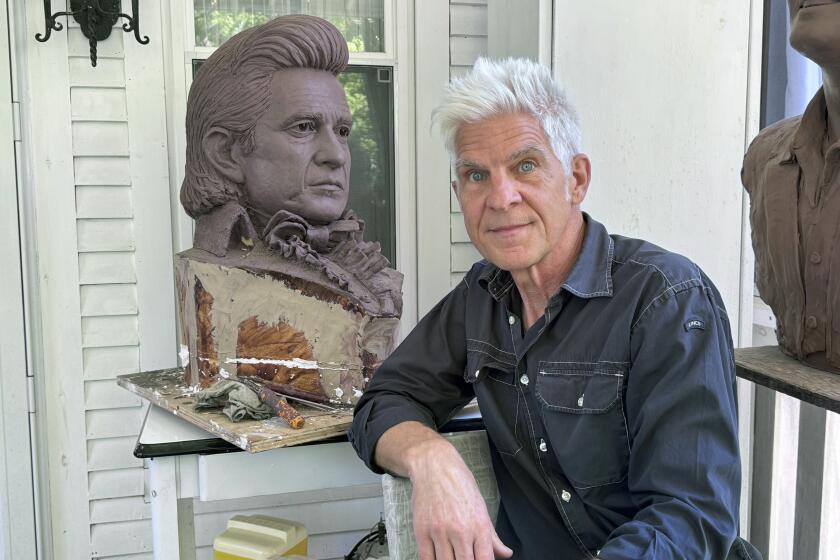Russia Finds Ex-Spy Guilty of Treason
Seven years after he left his homeland to write about espionage, hobnob with ex-CIA officials and live in the Washington area--where he once was the acting KGB chief--retired Russian Maj. Gen. Oleg Kalugin was convicted of treason here Wednesday and sentenced in absentia to 15 years in prison.
It was one of the few cases since the fall of the Soviet Union in which a trial was conducted in absentia, and it was seen here as a sign of how much Kalugin is detested by some of his former KGB colleagues for allegedly spilling the agency’s secrets in the West.
In addition to imposing the prison sentence, the court stripped Kalugin of his military rank and the state honors he acquired during the years he ran the KGB’s counter-intelligence department.
“A triumph of Soviet-style justice,” Kalugin said of the verdict in a telephone interview with The Times from the United States. “This was a case of political retribution and revenge, carried out by the KGB old guard, who are now back in power.”
Kalugin pointed out that his conviction came only a day after Russia’s Supreme Court upheld the treason conviction of a military journalist who reported on the Russian navy’s dumping of nuclear waste, a case that has perturbed human rights advocates.
The conviction was greeted with frank delight by Vladimir A. Kryuchkov, the hard-line head of the KGB from 1988 to 1991 who helped organize the unsuccessful coup against then-Soviet leader Mikhail S. Gorbachev in 1991. In a rare interview, Kryuchkov called his onetime subordinate a “sheer traitor.”
“He betrayed our motherland, which he--as a KGB officer--was supposed to treasure and protect.... He rejected and betrayed all those things that he owed his motherland. He also betrayed his former friends and colleagues, who worked shoulder to shoulder with him,” Kryuchkov said.
The court ruled that Kalugin’s activities are “harmful to Russia’s national security” and that he has provided classified information to the United States. The court also found that Kalugin published secrets about a series of past actions by Soviet intelligence meant to discredit the CIA, the director of the FBI and U.S. counterintelligence services.
The charges were based on information in Kalugin’s book, “The First Directorate: My 32 Years in Intelligence and Espionage Against the West,” published in the U.S. in 1994.
Kalugin left the KGB in 1990 and publicly condemned the organization as a menace that needed to be dismantled. He came under increased scrutiny with the 2000 election of Russian President Vladimir V. Putin, himself an ex-KGB officer, which raised the political standing at home of the KGB and its domestic successor agency, the FSB.
FSB chief Nikolai P. Patrushev told a reporter in March that Kalugin had caused “colossal damage” to the Russian intelligence service, apparently referring to Kalugin’s testimony last year in the Florida espionage trial of retired U.S. Army Col. George Trofimoff, who was convicted of spying for Russia and the Soviet Union.
Kalugin, who said he appeared only reluctantly at that trial, maintains that his testimony was not crucial to the prosecution.
In the decision Wednesday, the court dismissed the treason charges related to Kalugin’s testimony at the Trofimoff trial, saying it did not have access to the U.S. court transcripts.
Court-appointed defense lawyer Yevgeny Baru said he intends to contest Kalugin’s sentence. But in his telephone interview, Kalugin made it clear that he has no intention of returning voluntarily to what he called “Putin’s Russia.”
Kalugin said some prominent figures in the U.S. are appealing to Atty. Gen. John Ashcroft to grant him citizenship. “If it happens, I will be truly happy.”
Kalugin first went to the U.S. as a Fulbright scholar after having been recruited by the KGB; he later worked as a Radio Moscow correspondent in New York in the early 1960s. From 1965 to 1970, he was officially press secretary of the Soviet Embassy in Washington but actually was its acting KGB chief and ran a network of anti-U.S. spies.
Recalled to Moscow, Kalugin quickly rose in the KGB hierarchy, becoming the organization’s youngest general and head of foreign counterintelligence. He was put in charge of disseminating disinformation about the West and managing high-level defectors. The decision to try Kalugin in absentia came after he refused a summons given him by the Russian Embassy in Washington to return to his homeland. The legal code that allows trials in absentia in extreme cases is being replaced July 1, and such proceedings will be abolished.
More to Read
Start your day right
Sign up for Essential California for news, features and recommendations from the L.A. Times and beyond in your inbox six days a week.
You may occasionally receive promotional content from the Los Angeles Times.






